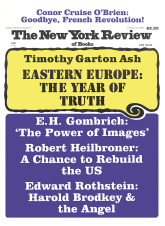In response to:
The Narcissistic South from the October 26, 1989 issue
To the Editors:
C. Vann Woodward’s comment on my interpretation of the origins and development of African-American culture in his review of The Encyclopedia of Southern Culture [NYR, October 26, 1989], is characteristically generous and uncharacteristically misleading. Professor Woodward begins his commentary by noting that “Charles Joyner is right in saying that Africans came to America without a common language or culture”; but he goes on to complain with gentlemanly forbearance that I “seem to be going a bit far in holding that ‘enslaved Africans were compelled to create a new language, a new religion, indeed a new culture.’ ”
I respond reluctantly and only because of Professor Woodward’s stern admonition in Thinking Back that a scholar’s “failure to enter publicly into colloquy…with his critics” may be taken as a sign of “sullen resentment of criticism.” The point in question is in my essay on “creolization” in the Encyclopedia, which is limited to discussing the language and culture of the Gullah-speaking people of the South Carolina and Georgia coasts. Insofar as it applies to Gullah language and culture, I am convinced that my emphasis on the creativity of enslaved Africans in the New World is more accurate than an interpretation emphasizing either the acknowledged “survival” of Africanity or the acknowledged adoption and adaptation of European culture.
“What I think he intended to say,” Professor Woodward writes, “is that they Africanized the old culture they encountered in the South or adapted it to their needs.” With respect to Gullah culture, however, I must decline Professor Woodward’s kind offer to rephrase what he thinks I intended to say. Enslaved Africans in the South Carolina and Georgia lowcountry outnumbered whites by as much as nine to one. Whether Fullah or Fante, Gola or Guinea, or whatever African ethnic group, the old cultures they encountered were far more often old African cultures than old European cultures.
I would not for a moment insist on creolization as a viable theory of southern culture more generally. Beyond the South Carolina and Georgia lowcountry, I have not found creolization theory particularly applicable to southern culture. Cultural creolization would seem to depend upon linguistic creolization. But neither demographic proportions, settlement patterns, nor linguistic history would seem to support such an interpretation across the entire region.
Still, I am not quite persuaded by Professor Woodward’s restatement that “they Africanized the old culture they encountered.” Settlers from Europe and involuntary settlers from Africa each encountered old cultures from the Old World newly brought by the other group to the New World. The only truly old cultures in the New World were Native American cultures. While those may have had more influence on the new transatlantic arrivals than we yet understand, they do not seem to have been nearly so influential as the influence of European and African cultures upon one another. Perhaps what he intended to say was that in the convergence of various European cultures and African cultures in the South, Euro-southerners had their old cultures Africanized by their black neighbors and Afro-southerners had their old cultures Europeanized by their white neighbors.
Charles Joyner
University of South Carolina,
Coastal Carolina College
C Vann Woodward replies:
On the whole, Professor Joyner is more successful in intuiting what I “intended to say” than I was in fathoming what he “intended to say.” What he does say in his article still suggests to me a much broader application of his theory than he apparently intended. I am therefore pleased to learn in his letter that he “would not for a moment insist on creolization as a viable theory of southern culture more generally.”
This Issue
February 15, 1990



